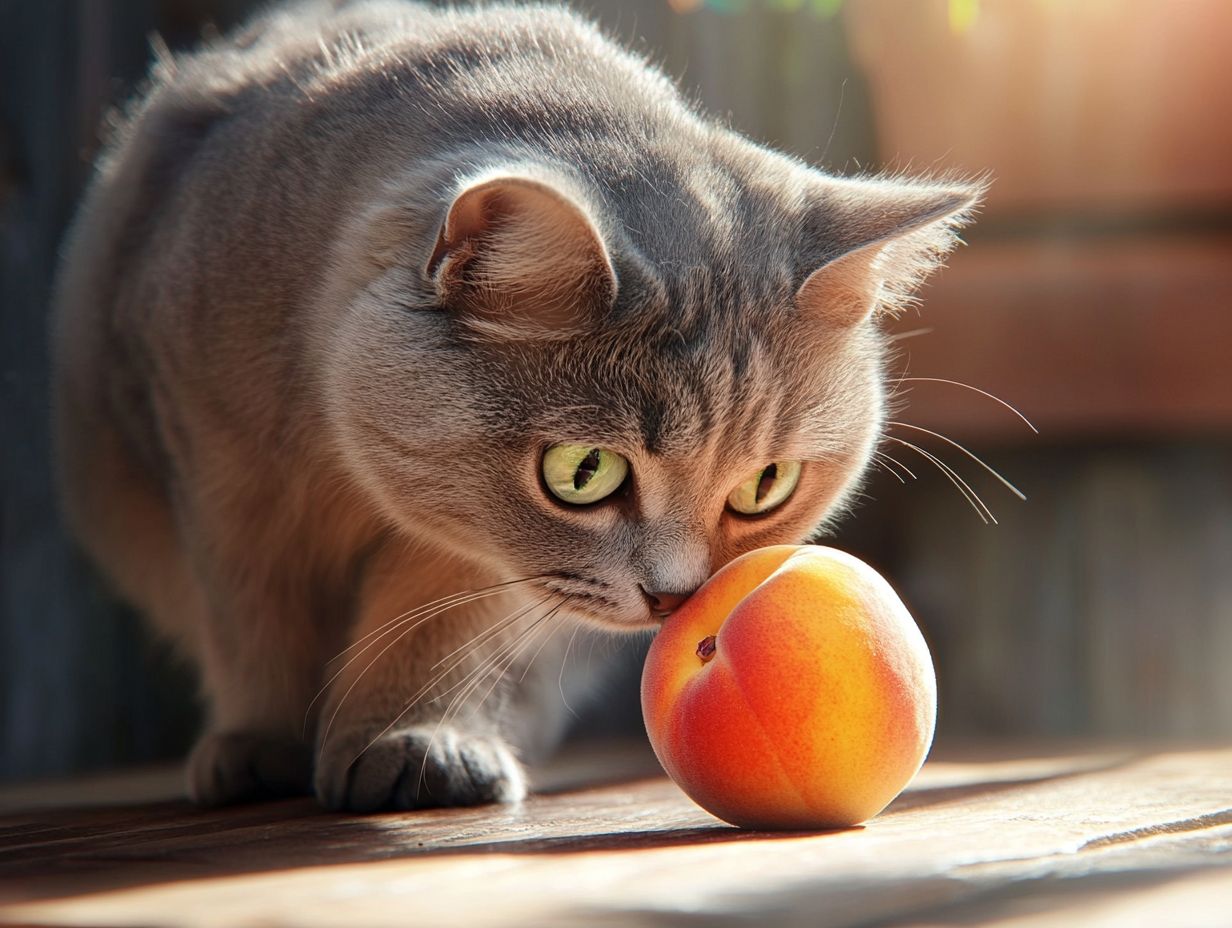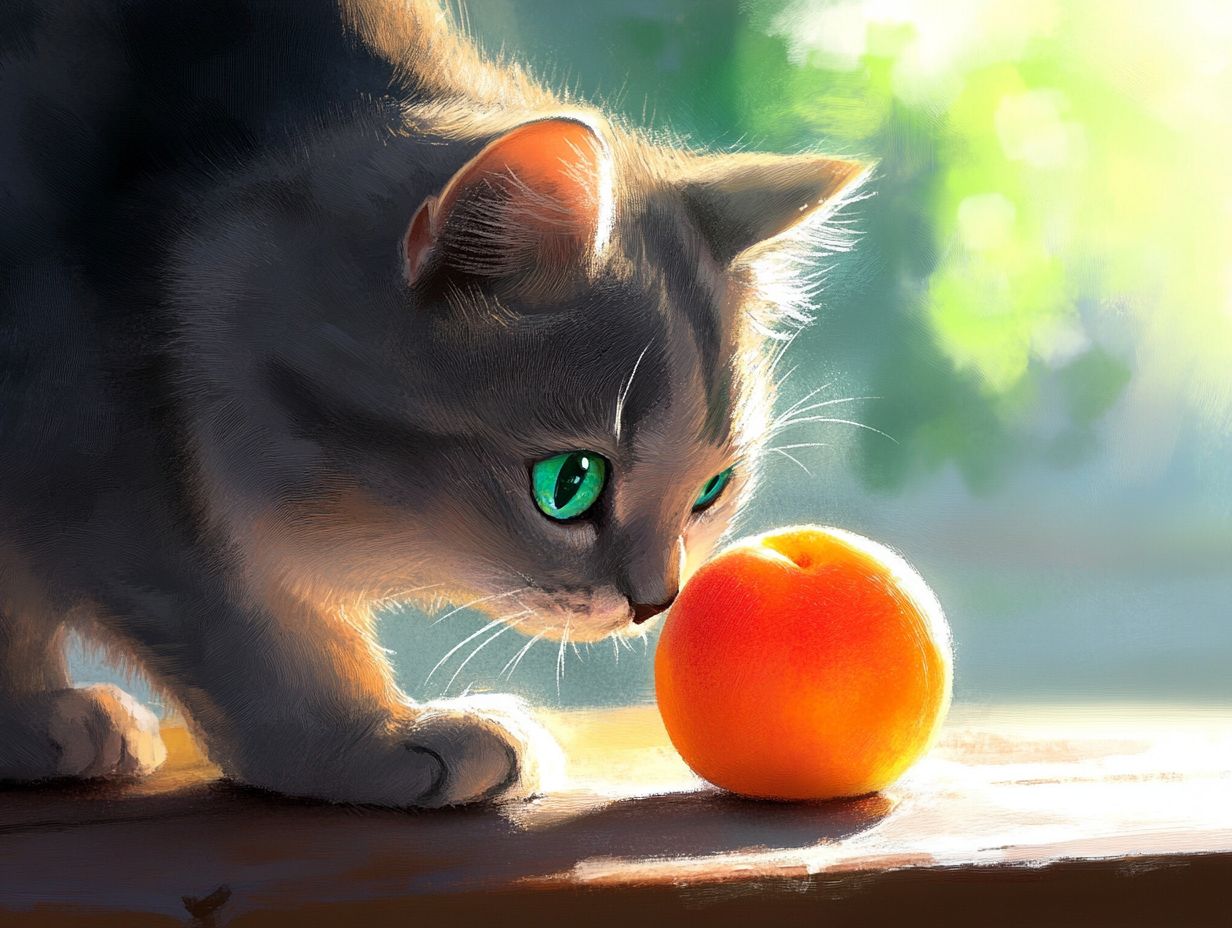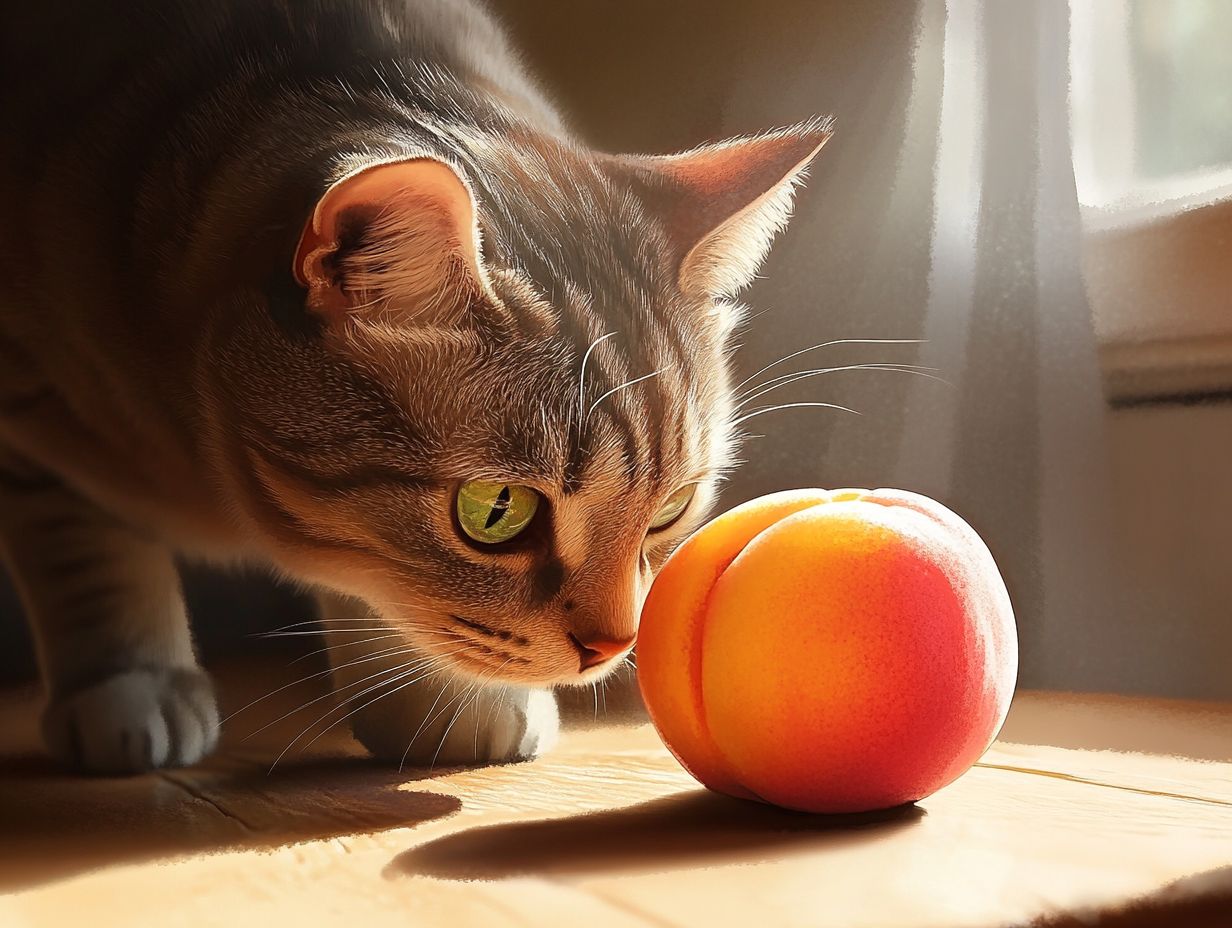Curious about whether your feline friend can indulge in the juicy sweetness of peaches? You’re not alone! Many cat owners wonder about the safety of sharing human foods with their pets.
This article explores the potential risks associated with feeding peaches to cats, discusses health concerns, and suggests safe alternatives.
It also offers tips on how to introduce peaches in moderation if you choose to do so. Read on to find out what’s best for your feline companion, ensuring their health and safety!
Key Takeaways:

- Consider potential risks and health concerns before feeding peaches to cats.
- Cats can safely consume small amounts of peaches as occasional treats, but it is best to stick to their regular diet and avoid overfeeding.
- Consult a veterinarian if unsure about introducing peaches to your cat’s diet; there are plenty of safe and healthy alternative treats available.
Why is This Question Important?
Determining whether cats can eat peaches is an important concern for pet owners focused on their cats’ health and well-being. As meat-eating animals, cats possess specialized digestive systems that may react differently to various foods, including fruits.
It is crucial for pet owners to understand the potential health hazards associated with certain chemicals, such as cyanide and amygdalin, found in the pit, stem, and leaves of peaches. Educating oneself about these implications is essential to prevent any adverse outcomes.
Veterinarians provide valuable insights into the specialized world of cat nutrition, offering tailored advice. Understanding a cat’s dietary needs involves recognizing the importance of essential nutrients for their overall well-being.
While it is safe for cats to consume a small amount of peach flesh, the risks associated with ingesting other parts of the fruit cannot be overlooked. Awareness of these dangers can protect cats from digestive issues and other serious health problems.
Can Cats Eat Peaches?
Whether cats can eat peaches depends on how the fruit is prepared and the moderation with which it is offered. Although cats may be curious about peaches, these fruits contain vitamins, minerals, and antioxidants that can be harmful to cats if not prepared correctly.
Pet owners should ensure that any peach given to a cat is washed, cut into small pieces, and free of pits or harmful chemicals. This way, the positive feeding experience does not expose the pet to unnecessary risks.
How to Introduce Peaches Safely
To safely introduce peaches into your cat’s diet, follow these steps:
- Start with a small piece, about a quarter of a teaspoon of peach flesh.
- Monitor your cat for any adverse reactions, such as vomiting or diarrhea.
- Never give your cat the pit, leaves, or stem, as they are harmful.
Factors to Consider
Before adding peaches to a cat’s diet, consider factors such as preparation, portion size, and the individual health of the cat. While the sweet juiciness of peaches may attract your furry companion, this fruit should only be offered in small portions and on rare occasions.
To avoid potential digestive issues—since cats lack the enzymes necessary to properly break down plant matter—they should be given only a small piece of peach. It is essential to completely avoid the pit, which poses a choking hazard and may contain cyanogenic compounds that are toxic to cats.
Consulting with a veterinarian may be advisable to ensure that the addition of this fruit will not negatively impact the cat’s specific dietary needs.
Potential Risks of Feeding Peaches to Cats

Feeding peaches to cats carries certain risks, including the potential for gastrointestinal upset and exposure to harmful chemicals found in various parts of the peach plant, such as the pit, stem, and leaves.
The peach pit contains amygdalin, which can release cyanide—a toxic substance that poses significant health threats if ingested. Gastrointestinal upset may occur if a cat consumes excessive amounts of the fruit or if any part of the peach, such as the leaves or stem, is accidentally fed.
Health Concerns and Symptoms
Common Symptoms of Adverse Reactions
- Vomiting
- Diarrhea
- Loss of appetite
- Lethargy
When to Consult a Veterinarian
If you notice any of these symptoms after introducing peaches to your cat’s diet, consult a veterinarian promptly.
Safe Alternatives to Peaches
If peaches don’t seem suitable for your cat, consider offering:
- Cooked chicken
- Catnip
- Small pieces of melon
- Blueberries
- Banana
Conclusion
In summary, while it is possible for cats to eat peaches, it should be done with caution, ensuring that it is a small, well-prepared piece and not a regular part of their diet. Always be aware of the risks involved and consider safer alternatives to keep your feline friend healthy and happy.
Cats that eat peaches can face health concerns primarily related to cyanide poisoning, which may occur if they consume peach pits or other potentially toxic parts of the fruit. Symptoms of cyanide poisoning can appear within minutes to hours, such as:
- Difficulty breathing
- Lethargy
- Vomiting
- Gastrointestinal distress
If any of these symptoms arise, it is crucial to consult a veterinarian immediately, as prompt treatment can significantly improve outcomes.
When considering feeding peaches, limit the portion size to a small piece equivalent to the size of a dime to minimize risks.
Pet owners should familiarize themselves with safe fruit options and gradually introduce new foods to minimize adverse reactions. This ensures that your cat remains healthy and safe while enjoying the occasional fruit treat.
Frequently Asked Questions
Can Cats Eat Peaches?
Yes, cats can eat peaches in small amounts.
Are Peaches Safe for Cats to Eat?

What Should I Do if My Cat Eats a Peach Pit?
If your cat eats a peach pit, observe for any symptoms of distress and contact your veterinarian immediately for guidance.
What Fruits Are Safe for Cats?
Safe fruits for cats include blueberries, watermelon, and small amounts of banana. Always introduce any new fruit gradually.
Final Thoughts and Recommendations
Cats can safely eat peaches in moderation, but pet owners must prioritize their pets’ health and safety by staying informed and exercising caution.
The nutritional profile of peaches aids in making informed decisions about cats’ diets. While the fruit provides some vitamins and hydration, its pits and high sugar content pose significant risks if not handled properly.
Pet owners should seek safe alternatives and monitor portion sizes to prevent gastrointestinal distress. Recognizing that individual cats may react differently allows for a more tailored dietary approach, ensuring balanced nutrition.
Ultimately, with proper knowledge and care, incorporating fruits like peaches can enhance a cat’s culinary experience without jeopardizing its health. Always consult your veterinarian before introducing new foods to your cat’s diet.